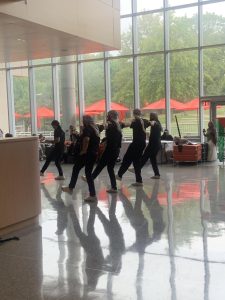“There is no such thing as a ‘superior’ or ‘inferior’ culture; there are only various cultural patterns which make up a beautiful, multicolored mosaic.”
This quote by Taslima Nasrin seemed to describe the essence of the message of Palestine Day, which was celebrated during common hour on Sept. 25, 2025. From the various cuisines, including kebab, pita, and coffee, to the giving of scarves referred to as Keffiyeh, a symbol of national pride, solidarity, and resistance for the Palestinian people, these features all showed how resilient the spirit of the Palestinian students is.
For onlookers it seemed to be just another cultural celebration at first; however, as the music became upbeat and the traditional Palestinian dancers and drummer were introduced, great enthusiasm developed among the students, manifesting into a large crowd.

The Dabke dance is a communal line dance that represents the cornerstone of the Arab community and has been used for ages to show identity among the various regions of Central Asia and, of course, the Palestinian community.
Through this collective spirit, many are invited to not only display their traditional moves but also to show their acceptance of the foreign cultures of the world, which is a great characterization of the Palestinian community. This was seen, as many students were invited to join in this![]() dance, most of whom were unfamiliar with the culture or even the dance but were enlightened by the uniqueness of the tradition.
dance, most of whom were unfamiliar with the culture or even the dance but were enlightened by the uniqueness of the tradition.
When asked by a student native to Palestine of what the dance meant, she boldly affirmed, “resistance.” But this cannot only be said of the dance but of the various other traditions and symbolisms of the Palestinian community as well, for example, the aforementioned Keffiyeh.
It was vividly presented in this celebration, and it has been a topic of research by scholars throughout history that the people of Palestine are a resilient people, and as the lyrics of the various songs played suggested, they are a community resistant to oppression.
“The message of this, the point of an event like this, is to show that we exist, and we’re proud of our existence. People don’t know what Palestine is. I feel like I’ll tell people, you know, I’m Palestinian. Oh, Pakistan? No. Palestine. Well, what’s that? And they have no idea that, you know, it’s a country with people and with a beautiful culture, so really the whole point of events like this and why our SJP (Students for Justice in Palestine) is active the way it is is to educate people; it’s to show people our culture, to display our food, our dance, our music, and our energy. We just want to show people and educate people about us as a people.” reported a student.
Education is a vital part in understanding culture, and perhaps if the curriculum were to focus more on overlooked societies and the potential merits of learning of a culture that is widely misinterpreted or ignored, celebrations like Palestine Day may be more appreciated.